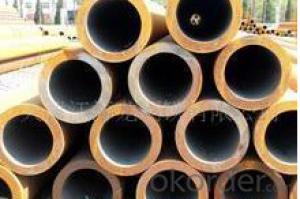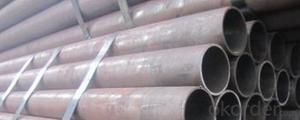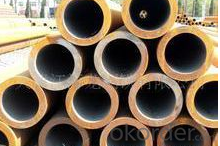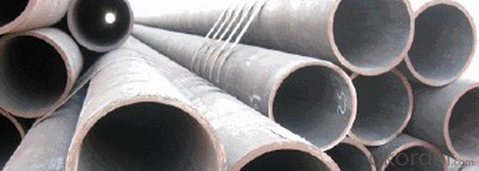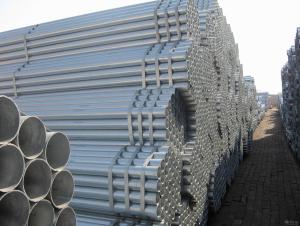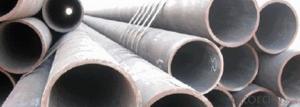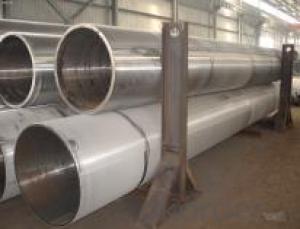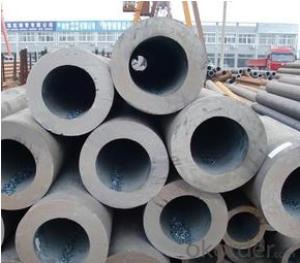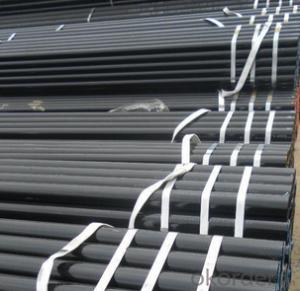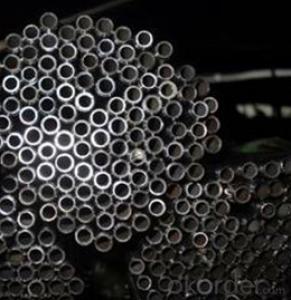Schedule 40 Seamless Carbon Steel Pipe API K55 CNBM
- Loading Port:
- Qingdao
- Payment Terms:
- TT OR LC
- Min Order Qty:
- 10 pc
- Supply Capability:
- 30 pc/month
OKorder Service Pledge
OKorder Financial Service
You Might Also Like
Quick Details
| Thickness: | 1.73 - 59.54 mm | Section Shape: | Round | Outer Diameter: | 10.3 - 914.4 mm |
| Secondary Or Not: | Non-secondary | Application: | Fluid Pipe | ||
| Technique: | Hot Rolled | Certification: | API | Surface Treatment: | Galvanized,vanish covering, black painting, galvenized ect. |
| Special Pipe: | API Pipe | Alloy Or Not: | Non-alloy | Length: | 5-12m as per customer's requirements |
| SCH: | SCH10~160, STD, XS & XXS | Payment Terms: | L/C T/T | Supply Ability: | 5000 Ton/Tons per Week |
| Product: | pipe prices | Grade: | 10#,20#,45#,A106(B,C),A53(A,B),12Cr1MoV,12Cr1MoVG,12Cr2Mo,13CrMo44,13CrMo45,15CrMo,15CrMoG,St52,St52.4,10#-45#,A53-A369,Cr-Mo alloy,ST35-ST52 | Standard: | API 5CT,API 5L,ASTM A106-2006,ASTM A53-2007,DIN 17175,GB 3087-1999,GB 5130,GB 6479-2000,GB 9948-2006,GB/T 17396-1998,GB/T 5312-1999,GB/T 8162-1999,GB/T 8163-1999,API,ASTM,DIN,GB |
Packaging & Delivery
| Packaging Detail: | By bundles, seaworthy wooden cases, steel framed cases, and simple packaging or according to the demand of the customers. |
| Delivery Detail: | within 5-15 days |
Specifications
1.pipe prices
2.Supply Ability:5000 Tons per Week
3.Payment Terms:L/C T/T
High quality Carbon steel pipe, Best pipe prices
1) Application: Overheat pipe for low and mediumpressure boiler,boiling water pipe, locomotive smoke pipe(big and small),Carry gas ,water or oil in the industries of petroleum and natural gas etc
2) Materials: 10#, 20#, 45#, 15CrMo, 12Cr1MoV, 13CrMo44, 12Cr2Mo, 13CrMo45, 12Cr1MoVG, 15CrMoG, API J55, API K55, API N80, API L80, API P110
3)Pipe according to standard: GB 3087-1999, GB/T 8163-1999, GB/T 8162-1999, GB 9948-2006, GB/T 17396-1998, GB/T 5312-1999, GB 6479-2000, GB 5130, DIN 17175, API 5CT, API 5L .
4)Packing: By bundles, seaworthy wooden cases, steel framed cases, and simple packaging or according to the demand of the customers.
Technical Parameters of Seamless Steel Pipe
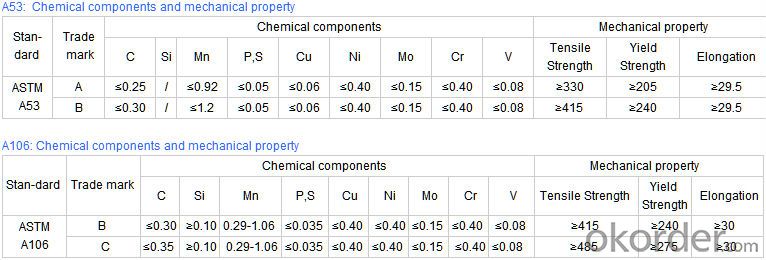
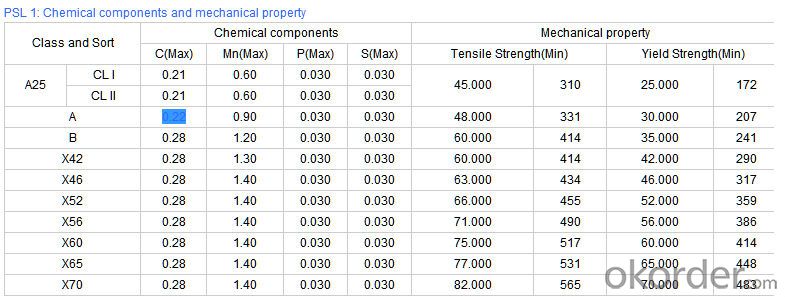
- Q: Can steel pipes be used for architectural purposes?
- Yes, steel pipes can be used for architectural purposes. Steel pipes are often used in construction projects for structural support, such as in the construction of buildings, bridges, and stadiums. They are also commonly used for architectural design elements, such as handrails, staircases, and decorative features. The durability, strength, and versatility of steel pipes make them a popular choice in architectural applications.
- Q: Can steel pipes be used for flagpoles?
- Yes, steel pipes can be used for flagpoles. Steel pipes are often used for flagpoles due to their strength, durability, and ability to withstand harsh weather conditions. They can be easily fabricated to the desired height and thickness, making them suitable for flags of various sizes. Additionally, steel pipes can be painted or coated to prevent corrosion and enhance their aesthetic appeal.
- Q: How are steel pipes used in the aerospace industry?
- Steel pipes are widely used in the aerospace industry for various applications. One of the primary uses of steel pipes in aerospace is for the construction of aircraft frames, where they provide the necessary strength and structural integrity. Steel pipes are often used in the fuselage, wings, and landing gear of airplanes, as well as in rocket launch vehicles and space shuttles. Steel pipes are favored in the aerospace industry due to their exceptional strength-to-weight ratio. They are lightweight yet incredibly strong, allowing for the construction of durable and reliable aerospace structures. This is particularly crucial in the aerospace industry, where weight reduction is a significant concern to enhance fuel efficiency and overall performance. Additionally, steel pipes are also utilized for the transportation of fluids and gases within aircraft systems. They are commonly used in the aircraft's hydraulic and fuel systems, carrying crucial fluids such as hydraulic fluid, fuel, and coolant. Steel pipes ensure the safe and efficient flow of these fluids throughout the aircraft, contributing to its proper functioning and performance. Furthermore, steel pipes are employed in the aerospace industry for heat transfer purposes. They are used as part of the aircraft's cooling systems, helping to dissipate heat generated by engines, electrical components, and other systems. Steel pipes are known for their excellent thermal conductivity, making them an ideal choice for transferring heat away from critical areas and preventing overheating. In summary, steel pipes play a vital role in the aerospace industry. They are used in aircraft construction for their strength and structural integrity, as well as for fluid and gas transportation and heat transfer. The use of steel pipes in the aerospace industry ensures the safety, efficiency, and reliability of aerospace structures and systems.
- Q: What is the thermal conductivity of steel pipes?
- The thermal conductivity of steel pipes can vary depending on the specific type of steel and its composition, but generally, steel has a relatively high thermal conductivity compared to other materials. It is typically around 50-60 W/m·K.
- Q: What are the different types of steel pipe coatings for underground gas pipelines?
- There are several different types of steel pipe coatings used for underground gas pipelines. These include fusion bonded epoxy (FBE) coatings, three-layer polyethylene (3LPE) coatings, polyurethane (PU) coatings, and coal tar enamel (CTE) coatings. Each of these coatings provides different levels of corrosion protection and suitability for specific environmental conditions.
- Q: How are steel pipes used in the manufacturing of food processing machinery and equipment?
- Steel pipes are commonly used in the manufacturing of food processing machinery and equipment due to their durability, corrosion resistance, and high strength. These pipes are used for various purposes such as fluid transportation, steam generation, and structural support in the machinery. They are also crucial for conveying liquids, gases, and other food ingredients safely and hygienically throughout the manufacturing process. Additionally, steel pipes can withstand high temperatures and pressures, making them ideal for applications like sterilization, pasteurization, and cooking in food processing machinery.
- Q: What are the different methods of insulation for steel pipes?
- There are several methods of insulating steel pipes, including applying a thermal insulation coating, using pipe wraps or jackets, using foam insulation, or utilizing heat shrink sleeves.
- Q: Are steel pipes suitable for offshore drilling platforms?
- Yes, steel pipes are suitable for offshore drilling platforms. Steel pipes are known for their high strength, durability, and resistance to corrosion, making them ideal for withstanding the harsh and corrosive marine environment. Additionally, steel pipes have excellent load-bearing capacity and can handle the high pressure and extreme conditions associated with offshore drilling operations.
- Q: What are the different methods of welding steel pipes?
- There are several methods of welding steel pipes, including arc welding, TIG (tungsten inert gas) welding, MIG (metal inert gas) welding, and oxy-fuel welding. Each method has its own advantages and applications, depending on factors such as the thickness of the steel, the desired strength of the weld, and the available equipment.
- Q: Can steel pipes be used for underground air supply systems?
- Yes, steel pipes can be used for underground air supply systems. Steel pipes are commonly used for underground applications due to their durability, strength, and resistance to corrosion. They can effectively transport compressed air, making them suitable for underground air supply systems.
Send your message to us
Schedule 40 Seamless Carbon Steel Pipe API K55 CNBM
- Loading Port:
- Qingdao
- Payment Terms:
- TT OR LC
- Min Order Qty:
- 10 pc
- Supply Capability:
- 30 pc/month
OKorder Service Pledge
OKorder Financial Service
Similar products
Hot products
Hot Searches
Related keywords
